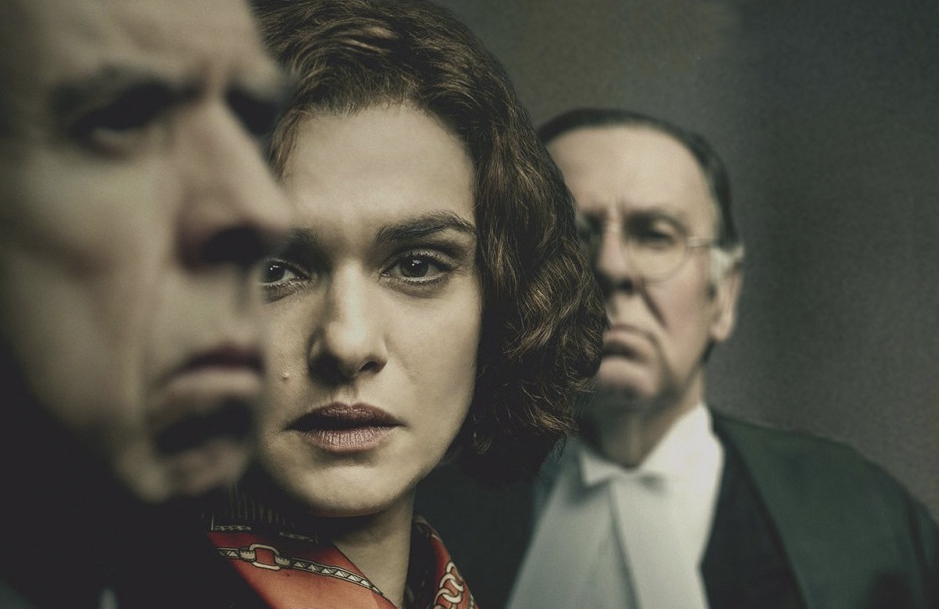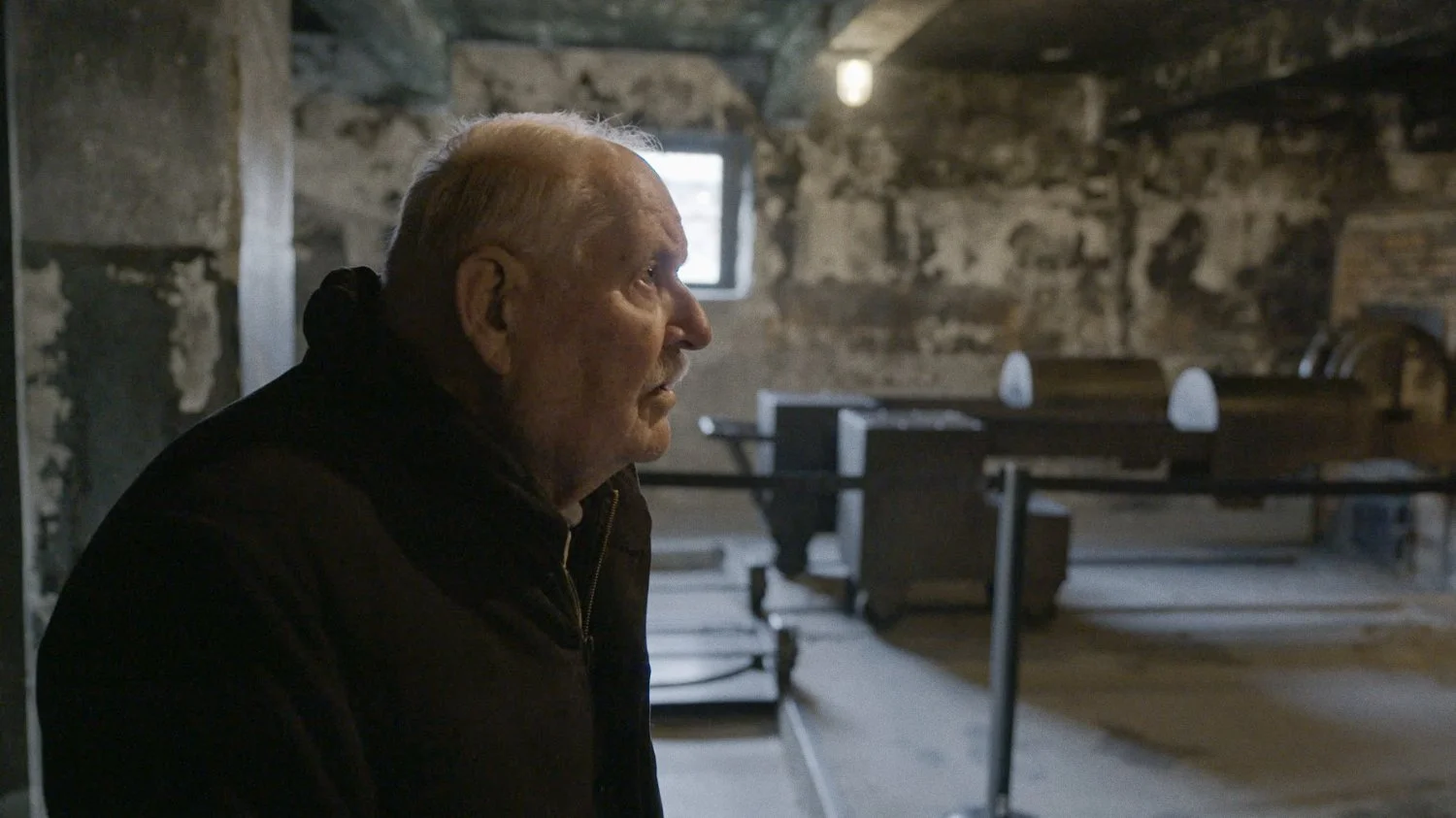An extraordinary film of truth and reconciliation from director Daniela Volker that was highly deserving of this year's Yad Vashem Award for outstanding Holocaust-related documentary…
The Zone of Interest ★★★★
Getting Away With Murder(s)
The Escape Act: A Holocaust Memoir ★★★★
Biržai Holocaust Memorial
The Chess Player ★★★★
Review: All Our Children ★★★★ - Director turned writer Stephen Unwin vividly brings a lesser-known Nazi atrocity to our attention
 The horrors of the mass killing of disabled children perpetrated by the Nazis are less well-known than the Holocaust, though they were arguably a rehearsal for the final solution. All Our Children, a moving drama from director turned writer Stephen Unwin, tells their story by focusing on one so-called clinic and the awakening conscience of Victor, the ageing doctor who runs it. Unwin dedicates his drama to his son Joey, who has profound learning difficulties, so this first play from the acclaimed theatre director is an intensely personal story.
The horrors of the mass killing of disabled children perpetrated by the Nazis are less well-known than the Holocaust, though they were arguably a rehearsal for the final solution. All Our Children, a moving drama from director turned writer Stephen Unwin, tells their story by focusing on one so-called clinic and the awakening conscience of Victor, the ageing doctor who runs it. Unwin dedicates his drama to his son Joey, who has profound learning difficulties, so this first play from the acclaimed theatre director is an intensely personal story.
Colin Tierney captures every nuance of Victor's struggle in a finely-calibrated performance, neatly contrasted with the cool certainty of his co-administrator Eric, a ruthless young Nazi ideologue, played with terrifying authenticity by Edward Franklin. Eric has no problem with the argument that these 'imbeciles' are a waste of money and precious resources.
The only woman in Victor's life is his gentle solicitous housekeeper Martha (luminous Rebecca Johnson). Indeed there is a suggestion that the bachelor might be gay, which we know could mean he'll share the fate of his charges. Meanwhile Martha has a hinterland that brings the outside world into the clinic, a husband at the front, a bright five-year-old son and a nubile 17-year-old daughter attracting unwelcome attention from Eric.
The doctor receives two visitors, catalysts for a change of heart, Frau Pabst, devoted mother of one of his 'patients' and Bishop Von Galen, a real-life champion of the helpless victims of Hitler's Euthanasia Decree.
Lucy Speed plays Frau Pabst, with heartbreaking and increasingly strident desperation, convinced Victor is hiding the fate of her son, but his evasive answers are more an indication of his inability to explain why he cannot help her and his fears for his own predicament than of callousness.
So it is left to Bishop Galen to make a difference, to add his righteous anger to her furious distress, and so fully awaken Victor's conscience. David Yelland plays Galen with blazing authority – the words righteous indignation are overused, but this is surely what they mean.
Mindful of the fate of so many committed Christians under Hitler and in the light of Eric's contemptuous denouncement of the Bishop, you fear for him. Unwin does not reveal his fate – suffice to say he was beatified by Pope Benedict XIV.
One of the most moving moments, a beautiful heartfelt declaration of real love and affection for her charges from Martha which serves to finally determine Victor's way forward, has all the authenticity of the playwright's experience of the love and joy of living with these children. That he can also write witty, albeit dark lines, evoking audience laughter, only makes the situation more real and immediate. A fine writing debut for this seasoned director.
By Judi Herman
Photos by Camilla Greenwell
All Our Children runs until Saturday 3 June. 7.30pm (Mon-Sat), 3.30pm (Sat only; plus 18 & 25 May). £22-£30. Jermyn Street Theatre, SW1Y 6ST. 020 7287 2875. www.jermynstreettheatre.co.uk
Click here to read more theatre reviews.
Review: Denial ★★★★ - Fine performances prove attack is the best form of defence to demolish Holocaust denial
 Hitler apologist David Irving would have loved to have his day – or days – in court face to face with Deborah Lipstadt, the historian he sued for libel for labelling him “one of the most dangerous spokesmen of Holocaust denial”. It is more a strength than a weakness of the film charting Irving’s high-profile defeat by Lipstadt's team of lawyers that Lipstadt herself maintains a dignified ‘silence in court’.
Hitler apologist David Irving would have loved to have his day – or days – in court face to face with Deborah Lipstadt, the historian he sued for libel for labelling him “one of the most dangerous spokesmen of Holocaust denial”. It is more a strength than a weakness of the film charting Irving’s high-profile defeat by Lipstadt's team of lawyers that Lipstadt herself maintains a dignified ‘silence in court’.
Mick Jackson’s film (script David Edgar) is elegantly structured, giving a taste early on of what might happen if Rachel Weisz’s passionate, intelligent Lipstadt does not keep her own counsel. Timothy Spall’s Irving is chilling from the first glimpse of his eyes, narrowed balefully with Lipstadt in his sights, preparing to hijack her keynote lecture at UCLA by interrupting, shouting her down, and publicising his latest pro-Hitler book.
Once Irving has sued her, in the British legal system where she must prove her innocence, the action moves to London, and the imposing Inns of Court. The exteriors are shot on location. The wood-panelled interiors, crammed with clubbable members of the huge defence team meeting over wine and cheese, conjure up fusty, yet reassuringly British legal traditions. It’s heartening to see the older, experienced legal eagles bringing on the bright youngsters who research the case.
Less heartening is the reaction of British Jewry’s great and good. They advise Lipstadt to fundraise and settle out of court rather than risk defeat and affording Irving the oxygen of publicity. But really the spotlight here is on the twin stars of the legal firmament, Jewish celebrity solicitor Anthony Julius, and non-Jewish, avowedly philosemitic chain-smoking barrister Richard Rampton QC. Andrew Scott (Julius) and Tom Wilkinson (Rampton) give extraordinarily detailed portraits of a pair with incisive brilliant minds used to working seamlessly together.
There’s no such meeting of minds with the spiky Lipstadt. The Kafkaesque legalities make her frustrated and suspicious. Even a trip to Auschwitz does little to endear Rampton to her (she does not see what we do – that he’s visibly moved by his painstaking onsite research) and only when they share a nightcap in her London hotel does she thaw. Thus they establish the trust that enables her in turn to reassure the anxious Holocaust survivors whom Rampton and Julius know would be easy meat for Irving if called as witnesses. During our interview with Rampton in the January 2017 issue of JR, he confided that this moment in the hotel didn’t happen, though he appreciates the poetic licence.
So despite his displays of virulently antisemitic histrionics conducting his own case in gripping court scenes, Irving simply doesn’t get the chance to tempt Lipstadt into the ring and the rest, as they say, is (genuine) history.
By Judi Herman
Denial will be available on DVD from Monday 5 June.
Read Judi's interview with Richard Rampton QC in the January 2017 issue of Jewish Renaissance, or find it on this site by following the link on the home page.
Click here to read more film reviews
Artist Julian Hanford seeks crowdfunding to commemorate the Holocaust with six million domino tiles
 London-based artist Julian Hanford is planning to create an art installation composed of six million domino tiles to commemorate World War II and the 70 years that have passed since its end. The project, FALL, is estimated to cost £1.58m and Hanford is looking to you, the public, for help.
London-based artist Julian Hanford is planning to create an art installation composed of six million domino tiles to commemorate World War II and the 70 years that have passed since its end. The project, FALL, is estimated to cost £1.58m and Hanford is looking to you, the public, for help.
A Phundee.com page will be set up for people to make donations directly. The more you give, the bigger your gifts, which range from FALL t-shirts to owning one of the custom dominoes.
FALL, which will be stacked by domino champion Robin Weijers and co, is said to be bigger than the halls at Alexandra Palace once completed. The scale of the installation is meant to communicate the number of lives lost during Hitler's reign, including Gypsies, Poles, Communists, homosexuals, Russians, the mentally ill and, of course, Jews.
The art piece will be on display in Berlin at the end of 2015 and stand for six days to mark the six years of WWII. At noon on the sixth day, while streamed live online, a Holocaust survivor will knock over the first domino and set off a chain reaction that won't stop until the last tile falls 12 hours later.
For more information, visit www.fall15.com or follow them at @fallevent15.
By Danielle Goldstein
Interview: Ela Weissberger - One of the stars of the original Terezin production of Brundibár
 As a brand new Mahogany Opera Group production of Hans Krása's Brundibár, the 1938 short children's opera famously performed in World War II concentration camp Terezin (German Theresienstadt), comes to the Southbank Centre's Imagine Children's Festival this February, Ela Weissberger (pictured), who created the role of the Cat spoke to Judi Herman before she left her New York home to address the Scottish Parliament for Holocaust Memorial Day.
As a brand new Mahogany Opera Group production of Hans Krása's Brundibár, the 1938 short children's opera famously performed in World War II concentration camp Terezin (German Theresienstadt), comes to the Southbank Centre's Imagine Children's Festival this February, Ela Weissberger (pictured), who created the role of the Cat spoke to Judi Herman before she left her New York home to address the Scottish Parliament for Holocaust Memorial Day.
When did you arrive in Terezin? "I came 12 February 1942. I was one of the first children in Terezin and I stayed there three and a half years, till the end."
Did you come to Terezin with your parents? "I came with my mother because when it was Kristallnacht my father offered money to whoever would kill Hitler and they put him on a black list and the next day they came to pick him up – we never saw him again. My mother was 31 years old."
How did you get cast in Brundibár? "I was singing in a children's chorus in a synagogue in Prague, so singing for me was very wonderful. And friends of my uncle always said that I should sing, as my child's voice was beautiful for them. I didn't think so, but for them it was! When I came to Terezin, and to the children's home there [as men, women and children were quartered in different barracks], the youngest composer in Terezin was Gideon Klein. He also played the piano and played for 55 performances when I was in Brundibár. He played the piano and was also the one that was writing for us Hebrew songs. So we started singing in the children's room and the Nazis let us. We were allowed to sing and play and because of that there were some poems that were written in Terezin. Brundibár and the poems and our children's paintings with Friedl Dicker-Brandeis [the Austrian artist and educator who was killed in Auschwitz, 9 October 1944], is the only legacy of the Terezin children.
"I was chosen when Rudi Freudenfeld smuggled in the piano score of Brundibár. He was the son of the director of the Jewish orphanage in Prague. So Hans Krasa was able to redo the music for us and one day they said that if somebody knows about talented children in music we should try out for parts in Brundibár. So when it came my turn, Rafael Schaechter, who took the music in Terezin and was famous for playing Verdi's Requiem there – he knew me when I was eight years old – so when I came to try out for Brundibár, he said, 'You will be the cat'.
"My mother was a real music lover, and my father, and they went to the opera and all that before the war so she was so happy that I got the part of the cat. I came to my mother and said, 'You know, ma, I will be the cat in the opera', And my mother was wondering, 'what cat in the opera? I don't think there's an opera with a cat', so she didn't believe me! But I loved it. You know I think I was born a little show-off!"
What costume did you wear? "I had my sister's ski pants, my mother's black sweater, and I wasn't allowed to wear shoes because the cat had to be very quiet. Also Frantisek Zelenka [the production designer] was from the National Theatre of Prague and his fantasy was something unbelievable. Somehow they didn't cut the back of my hair, but split it and made it almost like ears for me. And then he had a little box left over of black shoe polish and with that he made me my whiskers and he covered my feet a little because they were so white. He didn't understand when I told him I was having such a hard time wiping it off because we didn't have soap. Only once a month we were able to take a hot shower and this was for just five minutes with two people under the shower at once."
Everybody in the camp loved to come and watch Brundibár and understood the message – that the evil organ grinder Brundibár was a thinly disguised Hitler. Did you play to rapt audiences and give people some feeling of fighting back, of defiance? "In Terezin the people in the audience were singing with us. They used to clap and stamp their feet and we used to repeat it a couple of times with them, the Victory Song [the number in which the children and animals celebrate their victory over Brundibár]. In the Czech Republic audiences still do that. Here in America, only when I am in Los Angeles with the opera, first we are two people and when we start to clap, then others start to clap with us!"
Ela Weissberger wrote a book about her time in Terezin called The Cat with the Yellow Star, which was first published ini March 2006, but has been re-published in a new edition this month. "You know I still have my original Jewish star," she says.
By Judi Herman
The Mahogany Opera Group's production of Brundibár runs Saturday 18 - Sunday 19 April. 7pm (Sat), 3pm (Sun). £10, £8 children. Watford Palace Theatre, 20 Clarendon Rd, WD17 1JZ; 019 2323 5455. www.watfordpalacetheatre.co.uk
Watch a trailer of the show here:
https://www.youtube.com/watch?v=B2TJbNdvrt0









